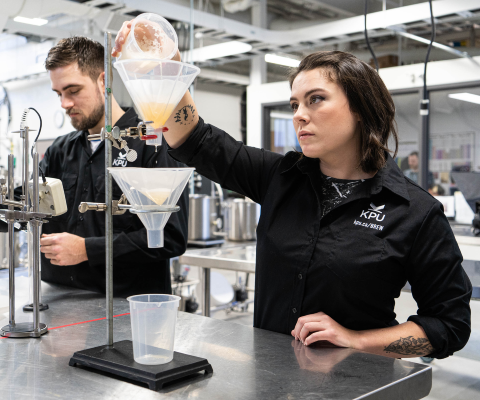What’s brewing at Canadian universities

Today is International Beer Day! Discover how universities are sharing their love of beer through innovative research, hands-on programs and exciting student clubs.
Undergraduate programs and courses in brewing
Dalhousie University has a new course for chemical engineering students that offers them the opportunity to apply what they have learned in class to the real world. As part of the course, a guest lecturer from a local brewery teaches students how to brew different types of beer. Students are then invited to sample the beers they prepared and share their opinions on them. While the course is primarily geared towards chemical engineering students, anyone is welcome to enroll and learn more about the science behind brewing.
Meanwhile, at Kwantlen Polytechnic University, undergraduate students can obtain a diploma in brewing and brewery operations. This degree was created to help meet the rising demand for people educated in brewing science in the craft beer industry. The program is open to everyone over 19 years of age and is recognized by the Master Brewers Association of the Americas. Classes are small and students have the opportunity to test their knowledge at the on-campus brewery, making it a very hands-on experience.
Graduate certificate in brewing science
Bishop’s University offers a graduate certificate in brewing science to students with a BSc in biology, biochemistry and chemistry. The two-semester program allows students to learn each step of the brewing process and science behind it. It also equips them with the necessary skills and knowledge to open their own microbrewery. The program involves over 200 hours of brewing experience as well as a business course and a four-week internship at a microbrewery. In addition to their coursework, students are encouraged to develop their own recipes that can then be prepared and sold in the campus brewery.
Brewing environmentally friendly beer
Brewing beer is very resource intensive and can impact the environment, particularly with large-scale brewing operations. Researchers from Trent University and Karbon Brewing are looking for ways to make brewing a more environmentally friendly process. Their goal is to research and develop green brewing technologies that eliminate waste generated by the process, while also offering internships and research opportunities to students. They hope to one day develop the first carbon-negative brewery.
Another project, at the University of Calgary, focuses on reducing water consumption. is working with local partners to develop Alberta’s first beer made with treated wastewater. Wastewater is already repurposed in other parts of the world, including on the International Space Station. Using new technology to filter wastewater, the project aims to combat water scarcity by demonstrating that it is possible to reuse water.
Hands-on learning at an on-campus microbrewery
The best way to learn is through practice and that’s exactly what students at the Université de Sherbrooke are doing at the Usine-école Siboire. The “factory-school” was created in partnership with Siboire, a local microbrewery founded by two former students, and specializes in microbrewing and microdistillation. The on-campus microbrewery is open to all students, whether they are enrolled in a brewing course or just curious about the beer-making process. Even those not interested in brewing can find something to do at the Usine-école Siboire; several administrative positions are filled by students who manage quality control, supply management and profitability of the microbrewery.
A brewing club for university students
The University of British Columbia has had a brewing club for students since the early 2000s. The club encourages students to learn about brewing and the science behind it through practical, monthly workshops. At these events, students learn each step of the brewing and bottling process, including malting, mashing, boiling, fermenting and more. All students are welcome to participate in the production of beers, kombuchas and other fermented drinks, though only club members can take home what they brewed during the workshop. The club isn’t all technical; members also organize drink tastings and tours of local breweries for fun.
About Universities Canada
Universities Canada is the voice of Canada’s universities at home and abroad, advancing higher education, research and innovation for the benefit of all Canadians.
Media contact:
Lisa Wallace
Assistant Director, Communications
Universities Canada
communications@archives.univcan.ca



